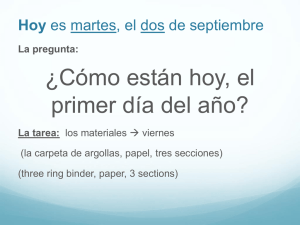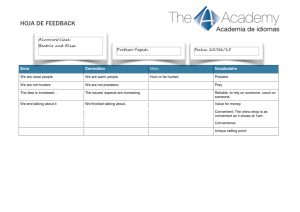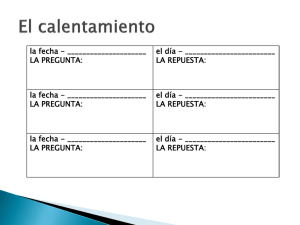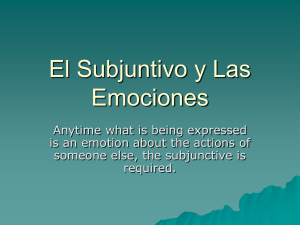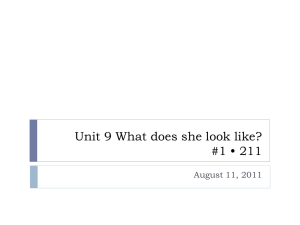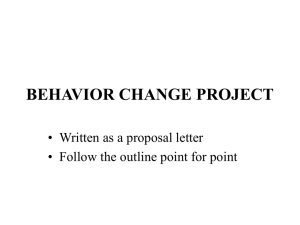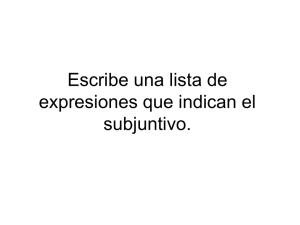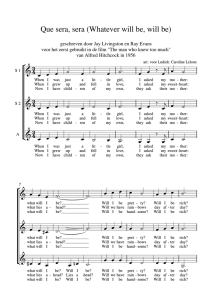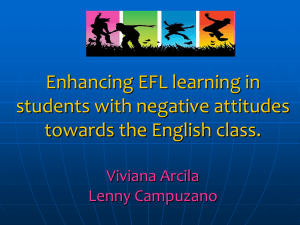File
advertisement
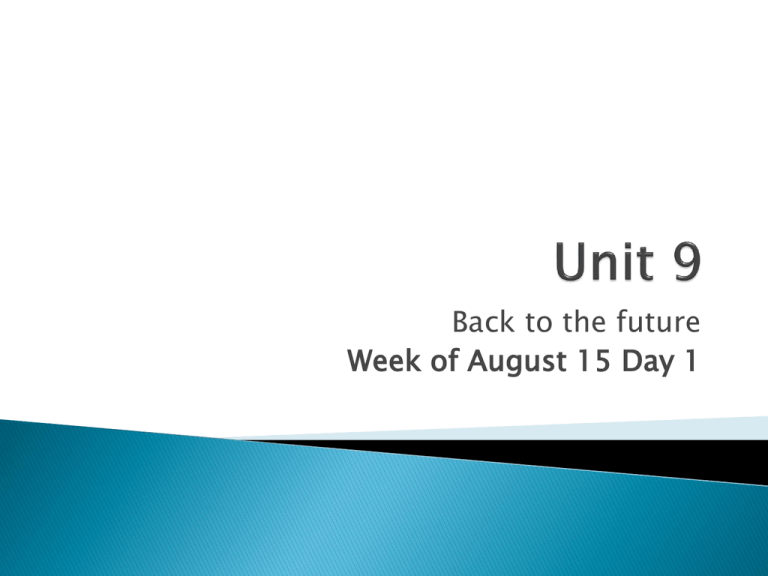
Back to the future Week of August 15 Day 1 Al principio de la carpeta, place important papers from the class. Mr. McGrath will tell you what documents should be there. •You are going to keep your daily “Rapid Write” activity in the first part of the notebook. • OJO — Cada vez que escribes un “Rapid Write,” debes poner la fecha y deben estar en la misma hoja de papel — Vas a dividir la carpeta por cada capítulo de la clase (Por ejemplo “Unit 9: Back to the future”) — IMPORTANTE — Escribe la fecha en cada hoja de papel que recibes u otro papel que pones en este parte de la carpeta. The notebook will be graded each time we have an oral exam. Write a paragraph about the following. What do you think of greetings like “Hola, gordi” or “Buenas tardes, fea”? Are they OK to use or can they affect someone in a negative way? OJO — Cada clase vas a escribir un “Rapid Write” al principio de la clase. Debes poner la fecha cada vez que escribes y tambien vas a poner este en una sección de una carpeta de argollas que tienes solo para la clase de ingles. Si no estás en clase, ya tienes que escribir un “Rapid Write” y debes preguntar a un compañero de clase para la actividad – no el profe. PAST •SPECIFIC TIME IN THE PAST: PRESENT •SIMPLE: •SIMPLE: • -ed • they live, he lives • lived, played • they play, he plays •GENERAL TIME IN THE PAST: • used to • used to live, used to play •CURRENTLY ONGOING (ando/iendo) I FUTURE am we are you are he/she is they are -ing I am living, he is playing • will live, will play •With “to be going to” (como ir + a + inf.) • is going to live, are going to play •CONDITION (Puede ocurir) • might live, might play 1. 2. 3. 4. 5. 6. Nowadays, people travel on subways Twenty years ago, we lived in Santiago. These days, everyone uses Facebook. Soon, many people are going to work from their home. We used to have a garden. In a few years, house phones will be a thing of the past. LISTEN TO AND READ ALOUD Tanya: This neighborhood sure has changed! Matt: I know. A few years ago, not many people lived here. But the population is growing so fast these days. Tanya: Yeah. It seems like there’s a construction site on every corner. Matt: Remember how we used to buy candy at that little grocery store? Now it’s a multiplex cinema. Tanya: Yeah, and they’re tearing down our high school. They’re going to build a shopping mall. Soon, there will be just malls and parking lots. Matt: That’s because everyone has a car! Fifty years ago, people walked everywhere. Nowadays, they drive. Using your paper, find a partner who has the other part of your sentence. LISTEN TO AND READ ALOUD Listen and practice. Part B. Complete the statements with your own information. With your partner, create 6 sentences to share: 1. 2. 3. 4. 5. 6. As a child, I used to … Five years ago, I … Nowadays, I … Next year, I´m going to … In five years, I´ll … In ten years, I might … Check the topic each person talks about. education entertainment fashion food housing medicine shopping sports technology transportation Answer these three questions about your topic. 1.What was it like in the past? 2.What is it like today? 3.What will it be like in the future? Conditional sentences with if clauses (Escriba en una hoja de papel con la fecha y pon en la carpeta de argollas.) Possible situation with If + simple present Consequence + future with will may, or might If you get a high-paying job, you won´t have to work as hard. If Simple present of the verb ¨to get¨ will (won´t = will not) and consequence Possible situation with If + simple present If you don´t have to work as hard, If Simple present of ¨to do¨ (don´t = do not) Consequence + future with will may, or might you´ll have a lot more free time. will (you´ll = you will) and consequence Possible situation with If + simple present Consequence + future with will may, or might If you have a lot more free time, you might get bored. If Simple present of the verb ¨to have¨ might and consequence Possible situation with If + simple present Consequence + future with will may, or might If you get bored, you may have to look for another job. If Simple present of the verb ¨to get¨ may and consequence Part A — Match the clauses. Part B — Write a sentence in your own words using the “If” clauses from Part A. ◦ If you eat less sugar, you’ll lose weight. ◦ If you walk to work every day, … ◦. ◦. Act. 8, p. 61 Act. 10, p. 62 Tiene una tarea en Quia.com … 411-19 Monday 1 p.m./Thursday 10 p.m. KMBAK867 411-28 Monday /Wednesday 7 p.m. XBFFM643 411-36 Tuesday/Thursday 7 p.m. ATKB366 211-59 Tuesday/Thursday 8:30 p.m. DHCGBX766 411-20 Wednesday 1 p.m./Friday 4 p.m. MPJDKD778 211-72 Friday 1 p.m./Saturday 10 a.m. RPNBC344 Go to the Quia website at http://www.quia.com/web. 1. Click Students. 2. Click the link Create my free account. Fill out the form that appears and select "Student" as the account type. When you are done, press the Create my account button. 3. You should now be in the Student Zone. Type in the class code in the text field and press the Add class button. All Rapid Write activites My Window Notes – Past, Present, and Future
